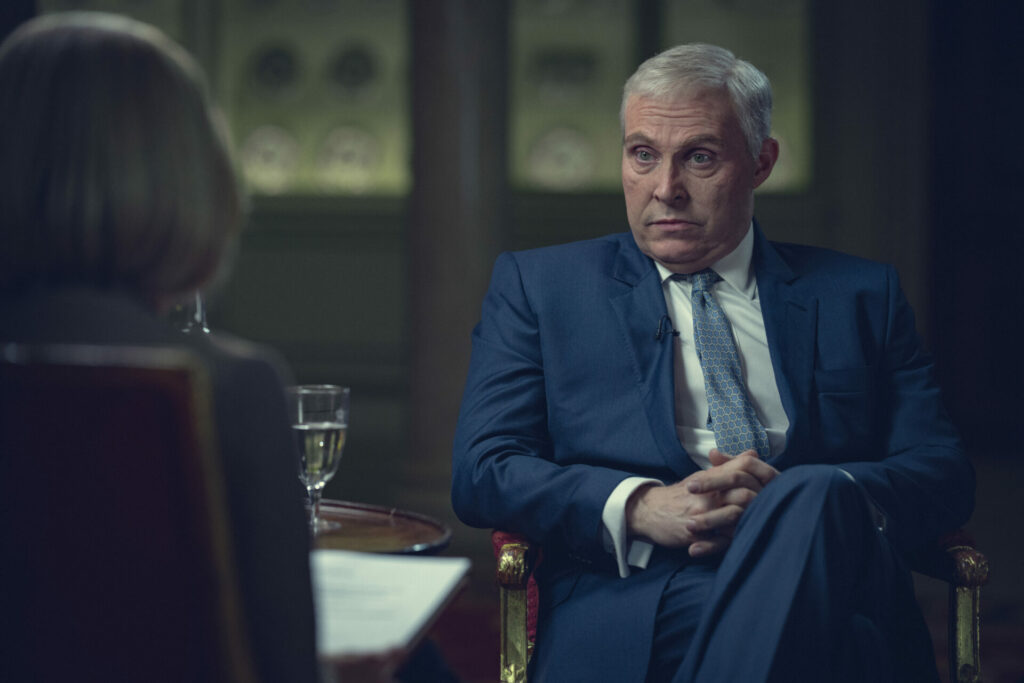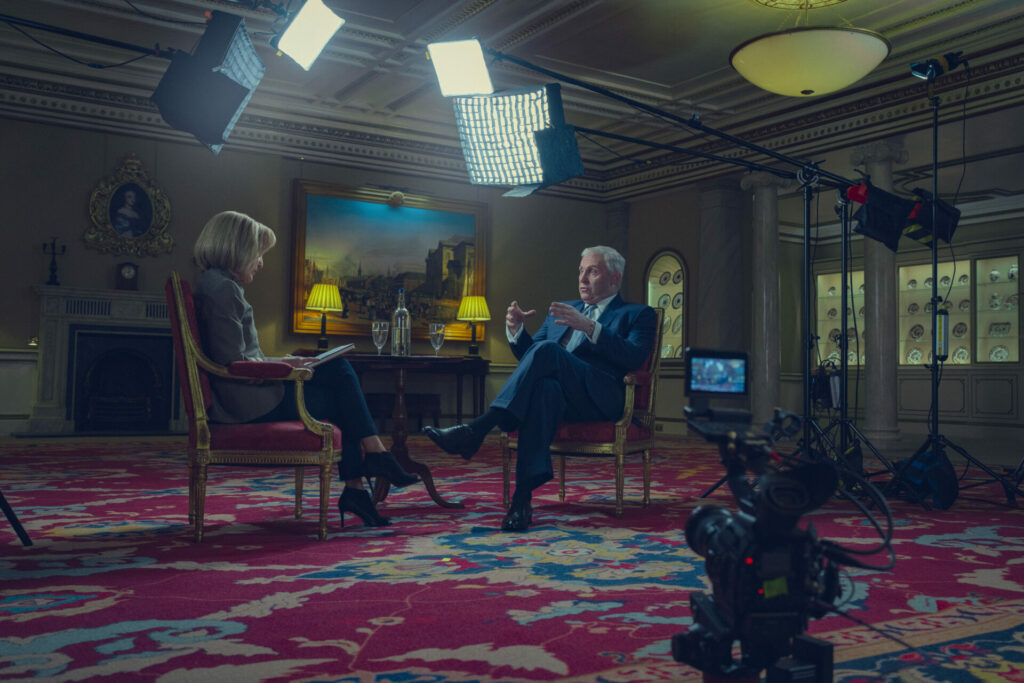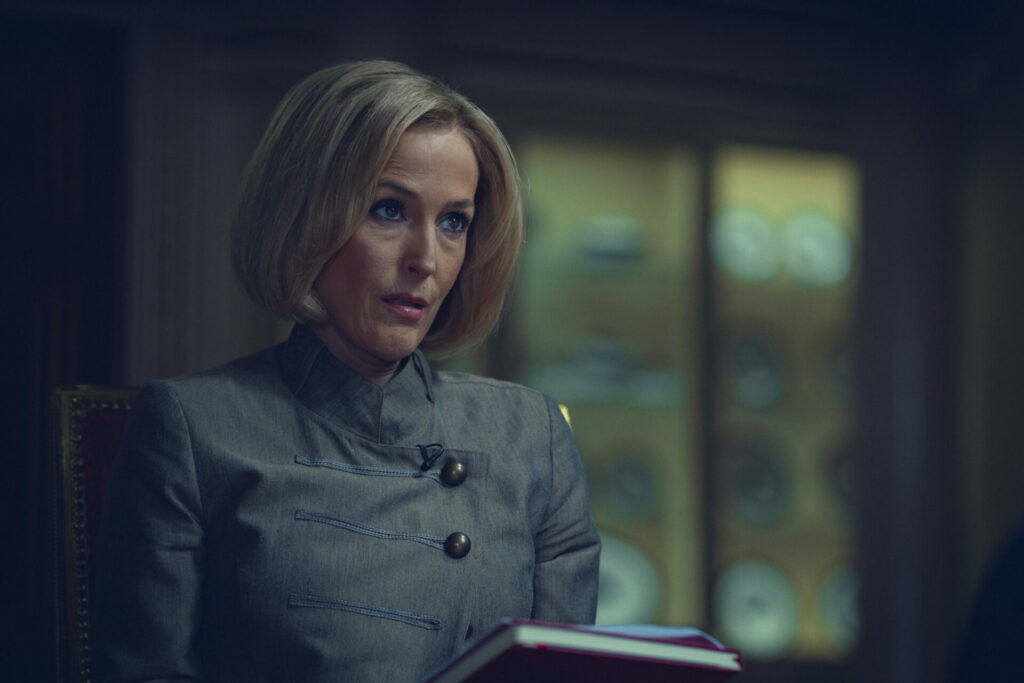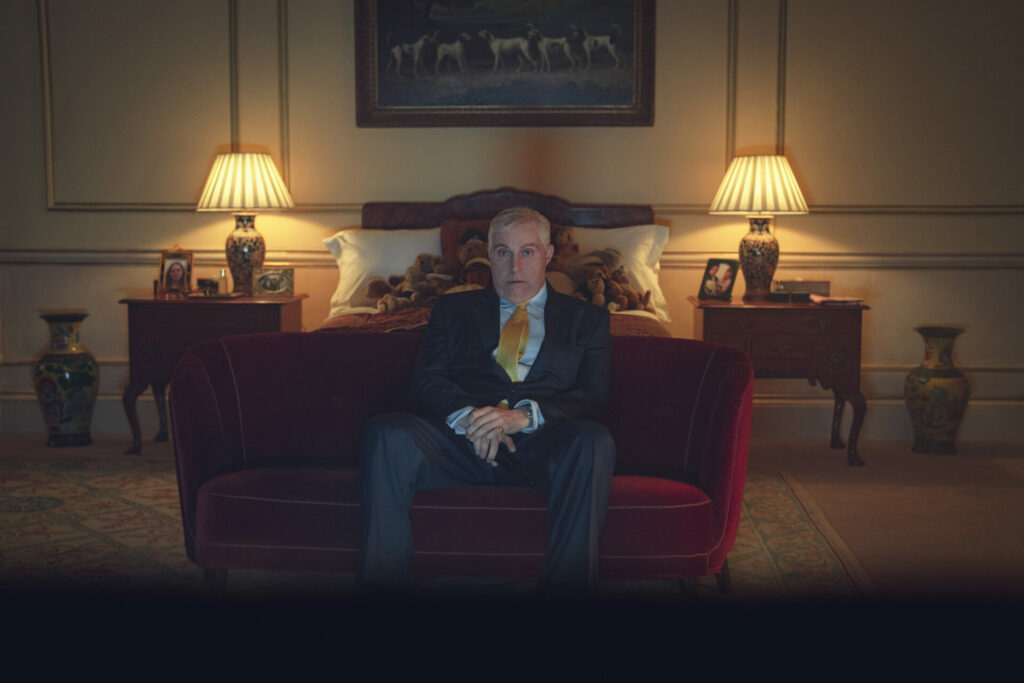Rufus Sewell on bringing Prince Andrew to life in ‘Scoop’: “He reminded me of David Brent”
Rufus Sewell on the subtle complexities of bringing Prince Andrew to life on screen in Scoop, the upcoming Netflix drama about the royal prince’s infamous Newsnight interview with Emily Maitlis

Nine years after Prince Andrew was photographed in New York with convicted sex offender Jeffrey Epstein, the royal joined Newsnight in 2019 for a ‘car crash’ interview of epic proportions.
In Scoop, Netflix brings to the screen the story behind the interview, with exceptional lead performances that mirror the awkward tension of the original Newsnight interview.
Rufus Sewell plays Andrew, while Gillian Anderson is BBC journalist Emily Maitlis, who challenges him on his dubious connections with child sex trafficker Ghislaine Maxwell as well as Epstein — whom the prince continued to visit despite Epstein’s first conviction. It’s a masterful pairing that sees Sewell and Anderson recreate in unnerving detail the interview that would see the prince step down from royal duties.
You and Gillian Anderson inhabit your roles so powerfully. What were your thoughts when you were first offered the role?
I was flattered actually because when I was at drama school and [did] my first few jobs, I always considered myself to be a character actor, and the only time I really flew when I was acting was when I was cast as something that was considered to be very different from me as a personality. I always found it much more liberating.
When I left drama school and started to get cast according to what people thought I looked like, for a long time I floundered because if I didn’t have a limp, an accent or some kind of disguise, it took me a long time to learn how to accept and work to myself.
So, for me, this was a chance to do the kind of thing that actually maybe people don’t know that I can. And so, I said yes. Then I had a few months to think, ‘What the fuck have I just said yes to,’ because I sat down to look at the interview again, which I remembered watching at the time, and realised that though I felt I knew how I could inhabit it, it wasn’t going to do itself. I had to do a lot of work to look like Andrew, sound like him and get behind the thoughts and gestures from my perspective. It could only ever be my perspective.
I obsessed about the interview, and I worked on it and worked on it. I would physically disguise myself even to work on it on my own, so I could suspend disbelief about myself. I’d dull down my eyebrows and grease my hair and I’d pad myself out, and just walk around in the shape of it. Slowly, it started to get closer and closer to something that felt right. And I did that work for a very, very long time.

Then, on the first day of filming, sitting opposite Gillian as Maitlis, I realised that she had done her own version of that. I was astonished by how accurately she portrayed the other character that I had been subconsciously studying the whole time, because it was terrifyingly familiar and similar. And it was the one part that had been missing from my prep – that laser-like focus on me. It was very strange because Philip [Martin], the director, his idea was to start with that interview, and just do that for two days on a loop without too much direction except in between, but to just be in it and live through it under that laser-like glare again and again with the cameras, different angles and stuff.
And we were living in that world. And it was quite a surreal thing because it felt strangely real. I mean, of course, you’re talking about suspension of disbelief, and I am not Andrew, and I don’t feel like him, but in terms of the tension of it, it was an extraordinary experience, actually. So, after that, we felt like a huge chunk of the film had been done by day three, which was a good way into it. I mean, kind of a terrifying way into it in one sense, but the good way of starting: once you’re in, you’re in.
So, there were no rehearsals with Gillian, you went straight into filming?
We just did it. I would rather do a terrible take than a brilliant rehearsal, because if anything ever really happens for the first time – unless it’s theatre which is a different thing – you want to be filming it. That’s why what Philip Martin did was so fantastic because he knew we’d done our work. We knew each other anyway; Gillian and I had worked together before. And what he really wanted to do was just sit us opposite each other because there’s not a lot to rehearse in terms of physical dynamics, we’re in the chairs, and to just let us do it and do it again and again and let it find its natural pace and shape. But to let whatever kinetic energy happens those first few times, even if it’s just for the odd moment, then you have that. So no, there wasn’t a lot of rehearsal. If we ever did a run-through, we’d always do it half-energy, because you don’t want anything special to happen when it’s not filming.
Was there any discussion or preparation with Gillian, or did you just trust each other to deliver what you were going to bring to the scene?
I like to work with what an actor gives me. I’m a big fan of Gillian’s. It was just a treat. I mean, [Maitlis] made it very difficult for Andrew, and therefore easier for me to play the part, because [Gillian] had the uncanniness of what she was doing to what I had studied. I really, really felt like I was in the hot seat. And luckily, I’d done enough work that what that brought out in me was more Andrew-like.
But no, there wasn’t. I think very much the idea was to have that initial meeting, because that’s what it really was: apart from a brief consultation that the characters had before, that was the time they really met. They didn’t get much of a gauge on each other until that time.

What were your concerns taking on the role?
As an actor your loyalty is to the truth of the character. You want to represent that, warts and all, which is actually the easy part. The tricky part with certain characters is trying to give the non-warts and even the elements of a character that might be less unattractive, more charming, equal light. You’re not there to rehabilitate; you’re not there to condemn, but merely to offer up and try to come up with something that you believe as an interior monologue makes sense to themselves in that moment. And I could see what I thought all of those things were by watching him closely.
I know from experience and from hanging out with other human beings in my life that it is possible to mix feelings of guilt with feelings of victimisation. Anyone who’s ever been in a relationship has had to deal with various levels of culpability and versions of apology and stuff. We’re all capable of it. It seemed to me like an extreme case, but then I had a duty to kind of fairly represent him. And that doesn’t mean to try to make people like him. That’s quite scary, because you don’t want to be accused of trying to rehabilitate someone or show that they’re nice or show it from their side. Walking that line is very, very difficult. But in the end, you’ve just got to do what you think is truthful.
Occasionally, when I read the script there were bits that I thought seemed vital to me because they showed something about his process, what he was trying to do, what he felt about himself, and what he was trying to make other people feel about him that weren’t in. So, I would ask for certain things to be put back in, and they were. I think maybe Gillian did the same.
It must have been hard to keep a straight face during some parts of it, like when Andrew delivers those lines about him not sweating. He does so with such conviction.
When I watched the interview, when I studied it, he reminded me quite a lot of David Brent [from The Office], in that particular circumstance, minus the charm or the sweetness. With a lot of my studying of Andrew, watching him through the years dealing with people, talking to members of the public, he could be very charming. And sometimes I found myself smiling along and kind of liking him. And when you remember the way that he was regarded, people have light and dark, they have good and bad. We are a mixed bunch. And that’s what I mean is my responsibility.
So, when I would see certain things in the interview, I found them quite comical. But I believe especially things like about the perfectly normal shooting party, and so many of the things that are kind of ridiculous. I think one of the big shocks to the public was watching someone who’s been in a bubble all their life, who was strangely divorced from having been told by their mates, “Shut up.” You know what I mean? He is a product of his circumstances and environment.

For me, really drilling down on why he was serious about those things did the moment a service, but it also made it funnier. Certain things that I found funny, I had to really get behind in a very serious way, not just out of respect for that moment, but also to get the laugh, if you’re going to be cheap about it. I know from experience, the people who watched the interview as we do it, their reaction’s quite similar watching the actual interview.
It’s an interesting journey that we go on as a viewer, because it goes from horror and shock and disgust to almost comical in some respects. But it’s all so horrendous because of the circumstances.
I know, I know. But that’s life. And one of the things about being able to watch it embodied by other people makes you able to observe it with a slightly more distanced eye.
Did you meet with Emily Maitlis at all in the research for this or…?
No. And I didn’t meet with Andrew, in case you wondered!
Yes, that would have been an interesting turn of events. That scene with Andrew in the bedroom and the cuddly toys is quite uncomfortable to watch. Presumably that’s fictitious?
There are different accounts. We have it on good authority that it’s true, but there are those – to be fair, who also can claim equal authority – that claim it is untrue. So, there are people within that world, who have been involved in that world, who swear that that is true. But there are people who say that it’s nonsense. So as far as the writer is concerned, as far as we were concerned, it’s true and there are people to back that up. But who knows? It may not be. But certainly, at the time that we were doing it, we felt like this was a true thing.
As a parent, what was the most uncomfortable situation that you found yourself speaking about in the scene?
My discomfort has to be different from Andrew’s discomfort. So much of his discomfort is about having to disguise the fact that he feels betrayed and wounded and afraid. Though I can’t speak with any authority, I believe the fact that he feels tremendous guilt about certain things but also a tremendous sense of victimisation.
One of the things that was most interesting is how often he was telling the truth. And a lot of what he’s trying to do is re-explain. There’s a lot of misdirected truths there. So, you can say for example, “I have no memory of someone.” And that might be true, but not for a good reason.
I haven’t made any final judgements about him as a person when I’m doing it. My feelings of distaste and horror about things that he may or may not be guilty of, and my own personal feelings in the performance are quite clear. But I’d rather my performance speak for me.
Is there any point that you felt sorry for him in any way?
I think he is someone who has enormous compassion for himself. And I think it’s very much part of the royal thing, but specifically him, because he was the favourite child, he was doted on, he was the one that was celebrated for his naughtiness. I think it’s quite possible for people in positions like that to not be necessarily actively, consciously cruel towards others, but to see them in gradations of less humanity the further they get away from themselves. So, it is possible to have no recollection of people that they treated a certain way because they don’t register in that way. And I think he is someone who is very sad, who had a sad childhood, who has enormous faults, who has many, many different qualities. And yes, you can feel sorry for someone.
This is the thing, you could see someone guilty of horrendous crimes in their youth, put them in front of a courtroom when they’re 96, and it’s hard not to go, “Aw, leave them alone.” It’s something inherent in us. So, it’s very easy to have alternate compassion and loathing and disgust for someone, and I think there’s room for all of that.
Have you made peace with the fact that you’re not going to be offered an honour now?
[Laughs] I came to peace with that a long time ago. So, I may as well play Andrew.
